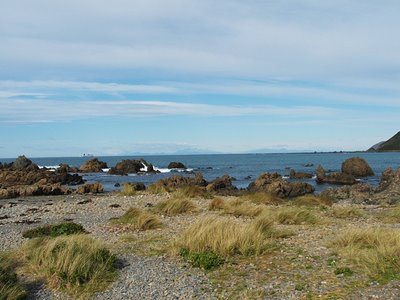Tuesday, October 31, 2006
Tricky
Will it? A number of US states have referenda on the ballots against gay marriage. A reasonable person might ask, are there no more important issues facing the US than that? The people who will most ardently support these referenda are also most likely to vote Republican, no matter what. Primarily for that reason, it’s been suggested that these referenda are on ballots specifically to increase far right Republican voter turnout.
Maybe so, but the Christian right isn’t too happy with the Bush administration for their own reasons, which can be summed up as that it’s not right wing enough for them. Some commentators have suggested that these voters may not even bother to vote.
Read between the lines of these items and the theme for this election year emerges: No one has the slightest idea what’s going to happen. As always, it’ll come down to voter turnout, and the right is usually better at mobilising their base than either the centre or the left.
So, with the all the built-in advantages the Republicans have, if they retain control of Congress it won’t be because they won but because the Democrats lost. It shouldn’t be this way: The Republicans in Congress should be on the ropes, they should be ringing around to get quotes from movers to ship their stuff back home.
That the race is so uncertain so close to Election Day says a lot about the state of the Democratic Party. Apart from the fact that they’re not Republicans, what, exactly, are the Democrats offering US voters? What is their alternative vision for America? Do they even have one?
If I’m asking these questions, and can’t answer them, it’s certain that disaffected Republicans are, too. There are millions of Americans who don’t vote Democratic who are looking for a reason to do so. I just can’t see the Democrats providing sufficient reasons.
Let me be clear: I fervently hope that the Republicans lose in a massive landslide. They deserve it for failing to exercise any oversight whatsoever on the current administration. Whatever high crimes and misdemeanours this administration may have committed, the Republican Congress must accept some blame for failing to stop it.
Still, there is some hope. On the state and local levels, some Democratic candidates are running aggressive campaigns aimed squarely at the Republicans. With some luck, there will be enough of this sort to help the Democrats gain control of Congress. But this is really their last warning, and probably their last chance, if they want to regain the White House in 2008.
What I want is for the Democrats to stand up and present an alternative vision for America, one in which peculiar death-wish far-right Christianity isn’t imposed as public policy. One in which the Constitution, Bill of Rights and rule of law are respected, where our allies are treated as such, and not as servants to be ordered around. I want, in short, the America that existed before Bush & Co took power.
The Democrats have made some good noises about stopping the anti-gay hysteria of the Republicans, but that doesn’t mean they’ll actually make things any better. They talk about respecting the Constitution and Bill of Rights, so they may end torture and restore habeas corpus. They may also find a way out of Iraq. But I have no idea how they plan on doing any of these things. I’m just hoping they get the chance to show us.
Trick on Treats?
Trick or Treat or Not
There’s actually a kind of backlash of sorts to Halloween. Some object to what they call “creeping Americanism,” by which they mean the importing of American culture and traditions, often replacing homegrown ones. Their objection is really to a sort of global homogenisation, something most Americans have already experienced with the same stores filling the streets of nearly every town, driving local shops out of business.
The other strain of objection comes from Christian fundamentalists who object for the usual reasons. The irony is that very often these people are led or encouraged by American evangelists. So, in a sense, their objection is itself another kind of “creeping Americanism.”
However, the vast majority of New Zealanders don’t really care one way or the other—if people want to participate in Halloween, fine and if they don’t, that’s fine, too. Actually, that easy-going attitude is how most New Zealanders approach most of life—apart from rugby, of course.
My own sense—without a shred of evidence—is that Halloween may already have peaked in New Zealand. Which isn’t to say that it’s been abandoned altogether. Our main “big box” retailer, The Warehouse, puts up displays in its stores hawking costumes, decorations, candy and related stuff. Other stores do similar things.
But most of the real action is with the media who continue to hype the day. Today our morning TV show, Breakfast, had quite a lot of references and plugs for the day. They interviewed a costume supplier, frequently talked about Halloween among themselves and also had the weather presenter give various bits of Halloween trivia and factoids.
Despite the efforts of retailers and media, there are normally very few kids who actually go trick-or-treating, and many of those who do don’t make even a slight effort at wearing a costume. In Auckland, most parents don’t let their kids walk to school, so it’s not surprising that they’re reluctant to let their kids knock on strangers’ doors begging for candy. This is true elsewhere in New Zealand, too.
My guess is that if Halloween survives in New Zealand, it may eventually evolve into a mere party theme, eliminating trick-or-treating altogether. Mind you, even that’s something the retailers could make money on.
Whatever happens this evening, I won’t be finishing all the candy myself. It’ll take me a few days to do that.
Monday, October 30, 2006
Viral Blogging?
When is a blog an ad, and when is an ad a legitimate blog?
Once of the first things I noticed when I signed up to Blogger were all the “blogs” associated with companies and products. Essentially, many of them are just commercials posing as blogs.
That doesn’t affect dedicated bloggers and blog readers because we have other ways of searching out interesting or useful blogs. The advertorial blogs don’t really get in our way.
But recently I came across the marketing ploy for the Dixie Chicks’ movie Shut Up and Sing. Let me say clearly I enjoy the Dixie Chicks’ music. We bought their latest album when it was released in NZ. I think they (and Natalie) didn’t deserve the hysterical over-reaction they got because of an extremely tame exercise of free speech.
However, I’m not sure I like being used to promote the film. The promoters use “interactive ads” inviting bloggers to post on the subject of free speech (which, interestingly, most of those I’ve read seem unable to spell). Bloggers are also invited to place the interactive ads on their own sites. This strikes me as a blogging version of “viral marketing”.
Now, I’m happy to support the Chicks, to buy their music, and I’ll probably go see their movie when/if it opens in
Yes, I do realise that by discussing this I’m helping to market the film (as the old saying goes, there’s no such thing as bad publicity). But having conversations about things is part of what blogging is all about and when we do we inevitably promote other blogs, news articles, podcasts, YouTube videos, whatever.
I’m not saying that the Dixie Chicks ploy is wrong. I wonder, though, if I’d feel more strongly about it if it was promoting something I’m opposed to. I guess I’m just a little unsure about the tactic in general. I’m curious to find out what other bloggers think about all this. If I find anything, I’ll post about that.
Sunday, October 29, 2006
The Cost of Nothing
The report by Sir Nicholas Stern, a former chief economist with the World Bank, was commissioned by Britain’s Chancellor of the Exchequer. It set out to determine the real costs of doing nothing on climate change, or of waiting for the successor to the Kyoto Protocol.
This is in stark contrast to the policies of the Bush administration which remains largely sceptical of the reality and costs of global warming, and which argues that it’s simply too expensive to do anything now. As the international consensus on dealing with global warming grows, the US faces being marginalised—again.
Britain is looking at strategies such as introducing “green taxes” to force people and businesses to adopt more sustainable practices. Britain has also seen the introduction of the term “food miles”, referring to the distance food travels from producer to consumer, with the resulting impact on energy use and carbon emissions. Unfortunately, sometimes this has been more about politics or PR than truth.
As a country on the edge of the world, New Zealand has to ship its products a long way. A recent British ad campaign urging the purchase of British butter pointed out how far NZ butter has to travel. But the campaign failed to reveal that even after factoring in shipping, New Zealand’s more efficient farming methods mean that in the end NZ butter requires half the energy of British butter.
New Zealand isn’t sitting back like the Bush administration and trying to defend inefficient or unsustainable foreign trade. Instead, the government is actively looking for ways to make things better for everyone. In a Sunday Star-Times article, Prime Minister Helen Clark said, “Why shouldn’t New Zealand aim to be the first country which is truly sustainable? I want New Zealand to be in the vanguard of making it happen for our own sakes, and for the sake of the planet."
Imagine if George Bush felt that way. Imagine further the implications if Bush pushed for more sustainable and renewable energy, thereby reducing dependence on Middle East oil. Bush could simultaneously help the planet, improve America’s balance of payments and make the US more secure from Middle Eastern terrorists.
Bush can’t do any such thing, of course. He’s an oilman, most if his administration is filled with oil men and women. Do any of them really want to do anything to reduce the source of their wealth?
All of which is perhaps one more reason why we should hope the Democrats regain control of the US Congress. They alone won’t be able to redirect US environmental policy, but they could at least stop the excesses of the Bush administration during its last two years, paving the way for real change after the 2008 presidential elections. The longer we wait to get started, the more it will cost us all.
Music hath charms
Disco is the only predominantly gay, lesbian and transgender music genre, which is probably why it gets so little mainstream respect. When, in 1984, homophobic hard-rockers cried "Disco sucks," and burned mountains of long-playing disco albums in that all-American icon of heterosexual masculinity, a football stadium, it was a sexual put-down, a collective gay-bashing, that disco never recovered from.I don’t know what 1984 incident he’s talking about, but on July 12, 1979 my hometown of Chicago was host to the infamous “Disco Demolition” in which an anti-disco stunt turned into a riot. That event was held at Comiskey Park, home to the Chicago White Sox, in between games of a double-header between the Sox and Detroit Tigers.
The background is this: Radio DJ Steve Dahl lost his job at Chicago radio station WDAI when the station converted to an all disco format. Dahl was hired at rock station WLUP (called “The Loop”) and hatched what amounted to the ultimate revenge: Disco Demolition Night.
When Dahl blew up a pile of disco LPs, many of the 50,000 fans who crammed into the park for the event streamed onto the field. The explosion itself left a hole in the outfield and that, combined with “fan” damage, led to the Sox forfeiting the second game to the Tigers. Later home games were postponed and there were complaints about the condition of the field for the rest of the season.
Whether Dahl was just playing to the yobbos and boofheads who listened to him on WLUP, or if he simply wanted to get back at an employer who fired him, is something only he can answer. But the stunt, along with ever-present “Disco Sucks” black t-shirts worn by his fans, created an extremely hostile environment for disco, particularly in the suburban shopping malls where I bought my music at the time.
There was a sinister undercurrent to all this, with homophobia and racism bubbling away. Disco was popular in clubs for gay people and African Americans, and hating disco gave the mainly white, mainly young male WLUP listeners a socially acceptable way to also hate gay people and black people.
It’s now more than a quarter century since that infamous night, but to this day there are people who are proud to have been part of it, and who, apparently, feel the same as they did back then. Google “Disco Demolition” and you’re likely to get more that 27,000 hits, many of them for sites that speak lovingly of that night.
Times change, people and society move on, but even now if music is considered “too disco” it’s still often dismissed, partly because it’s still usually associated with gay people. The dominant heterosexual culture may think it can dismiss and marginalise gay people as easily as it does disco, but it’s not for nothing that the virtual gay national anthem is a disco song: Gloria Gaynor’s “I Will Survive”.
Friday, October 27, 2006
Love it or leave it
Even as a kid I thought the bumper stickers weren’t just banal, but utterly absurd. Aimed squarely at critics of a Republican president waging an increasingly unpopular war (sound familiar?), the bumper stickers suggested that those who didn’t agree with the regime of the time should leave the country.
Criticism is not hatred. This would seem pretty obvious, but then as now whenever people criticise America or the current government they risk being accused of hating the country.
I believed, and still do, that criticism is a basic human right. It’s something all free societies protect as an essential component of free speech. Criticising something doesn’t automatically mean the critic hates the thing being criticised. On the contrary, criticising is often just another aspect of love.
Which brings me back to criticising America. In my case, and that of most others I know, criticism of America is based squarely on a love of our country, but a love tinged with deep disappointment with the way America is now. For me, some of my disappointment comes along with a kind of hurt, a “how DARE they do that to my country!” attitude.
However, it’s equally true that these days I criticise the same things I always have, even when I lived in America. I have no patience with religion-based bigotry, for example, and have always been critical of the US Republican Party’s unholy alliance with far right “Christians”, joining with them in trying to force particular fundamentalist religious views on everyone else. I’ve always criticised those with power using it to exploit or, at least, not helping to lift up those without power. And I’ve always been critical of businesses that put greed at the top of their agenda.
Criticism offered by both the left and the right is readily available in virtually every communication medium there is. This is as it should be. No matter how loony some criticism may seem (and there’s a lot of it out there that could be called by that name), we shouldn’t automatically assume that the critic is motivated by hate or disloyalty.
All of which is personally important to me because I’m now moving back into normal blogging mode, and that means there will be criticism sometimes, especially with the imminent American elections.
So, feel free to disagree with me. Challenge my assumptions and conclusions. Offer alternatives. Add more to my argument if you agree. But don’t dare assume that I hate anything, because I don’t harbour hate (except for fried liver, but that’s another matter).
Despite the preposterous assumptions of those bumper stickers, it’s possible for Americans to love it AND leave it. There are plenty of us expats out there who are living proof of that fact.
Thursday, October 26, 2006
Journey’s End
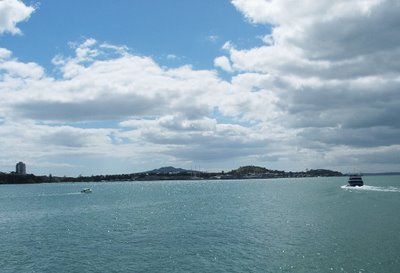
I’ve always found it a bit sad to be the person left behind when someone leaves, but there is one little unusual aspect to this one. We’ve been friends for so long now (let’s just say a LOT of years, and leave it at that) that should we not see each other for another seven years we’ll be able to pick up in the same sentence we left off with today. It’s a rare bit of constancy in a temporary, throw-away world.
It was interesting to see
One question was definitively answered. Ignoring slang, which always varies from place to place, I asked him if he thought my accent was any different now that I’ve lived in
The main reason I’ve devoted so much time to talking about the visit relates to something I said in my first post, that it was important “to know where I am in order to understand a lot of things I talk about”. It’s just as important to know something about this place, and this visit gave me the opportunity to talk about some places in this country and to show them.
Speaking of which, the photo accompanying today’s post was taken this morning from Prince’s Wharf in
Wednesday, October 25, 2006
Last Full Day
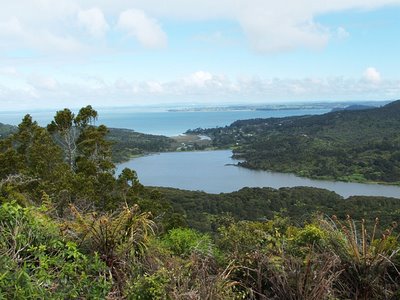
Today was Jason's last full day in New Zealand.
We went to two areas we hadn't made it to before—Takapuna in North Shore City and the Waitakere Ranges in West Auckland. It was a cloudy, sometimes rainy day, but there were a few sunnier moments.
The photo above is of the Manukau Harbour taken from the Arataki Visitor Centre high up in the Waitakeres. On a sunny day, this is well worth the effort to get there.
Tomorrow’s plan is a final trip into the Auckland CBD, then off to the airport later that afternoon. Then, almost suddenly, it seems, the visit will be over.
Tuesday, October 24, 2006
Starry Not
It’s a short trip, and there are other more adventurous ones in the area, but this is well worth the stop.
Another major destination was
Time is winding down for my friend's visit, so soon it’ll be back to normal blogging for me—whatever that means.
Monday, October 23, 2006
Visitations
When friends from the homeland make an extended visit, it’s an opportunity to see things all over again. It could be noticing things you haven’t before, or it might be seeing them again.
Like toilets.
Americans are always fascinated by
It’s probably pretty obvious, but half flush uses less water, and it’s for when you only wee. The full flush is for when there’s more to get rid of, like when you crap. But the water saving doesn’t end there: American toilet bowls are usually half-filled with water—why? The more water in the bowl, the more you need to introduce to flush it all out. That’s why typical American toilets can’t have a half flush option.
These days, I take this all for granted, which is a good thing. It just wouldn’t do to sit around all day thinking about toilets.
Another thing that Americans notice:
There used to be a home-grown fast food chain called Georgie Pie that specialised in low-cost pies and pie meals. It was run by a mostly Australian-owned supermarket company that panicked when the company’s overall profits weren’t as high as they wanted, so they closed down the Georgie Pie chain and sold the locations and intellectual property to McDonald’s. Maccas, in turn, closed all the restaurants, converted some to McDonald’s and sold off the rest. By buying the intellectual property, McDonald’s also saw to it that no one could revive the Georgie Pie competition.
So now our pies come from petrol stations, dairies, bakeries, some cafes, a few small pie shops and frozen ones sold through supermarkets (including the one that killed off Georgie Pie, of course). Nevertheless, Kiwi pies are well-worth the hunt—so much so that, on average, each year a couple dozen pies are consumed for every man, woman and child in New Zealand. Personally, I don’t know anyone who eats that many pies in a year, so it must be the tourists.
I don’t mean to suggest that there’s a connection between pies and toilets, apart from the obvious. It’s just that they’re two things in
Sunday, October 22, 2006
Road Trip
I thought about all of that as we began our road trip to Wellington. Technically, we weren’t going anywhere I hadn’t already been, but some of it I hadn’t seen very extensively, and in other areas we visited attractions that were new to me.
I’d never seen the Desert Road in daylight, for example, and the stark beauty of a cold desert is amazing. Our destination, Wellington, is New Zealand’s capital, with all that implies. But it’s also an unusual city, with houses built into steep hillsides. Those houses are reached by steep, winding footpaths or sometimes a private cable car system.
There are plenty of attractions in Wellington: The Houses of Parliament (the tour is good) and Te Papa (the Museum of New Zealand) are probably the best known things to see. But there’s also the Wellington Museum of City and Sea and the cable cars are both good things to see and do. A drive along the Wellington coast is also a must, as is a trip to the top of Mt Victoria. All up, we spent about two and a half days in Wellington.
But it’s a long, long drive from Wellington to Taupo, the next nearest tourist destination, not counting the ski fields of the Central Plateau. In Rotorua, our next destination after Wellington (we’d stopped in Taupo on the way south), we went to a thermal area I’d never been to before, Wai-O-Tapu Thermal Wonderland. Managed by the Department of Conservation, it’s probably the best thermal area to visit in the Rotorua area.
We also visited the Rotorua Museum, which is well worth the visit (which I hadn’t done before). In some ways, it was more interesting than Te Papa. Actually, I’d have to say that I’d probably choose the Auckland Museum, Wellington Museum of City and Sea and Rotorua Museum over Te Papa, but maybe that’s just me.
At any rate, we made it back to Auckland and took a brief lull. We’re now in a holiday weekend, Labour Weekend. Soon it’ll be back to work, and my friend leaves to return to the US on Thursday.
No Chevrolets were harmed in the making of the following photos (as always, clicking on a photo makes it larger).
The Desert Road:
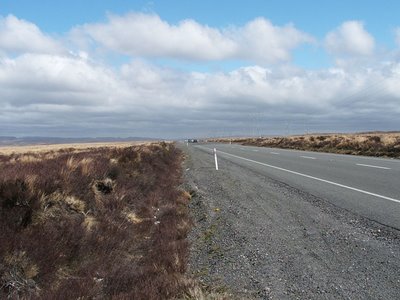
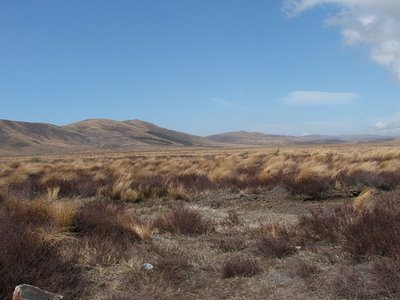 Mt Ruapehu from just off the Desert Road. That little patch of white on the lower left side of the photo is snow. It's the closest I've come to snow in New Zealand in nearly eleven years living here, and that means I've had about a dozen years without snow. For me, that's a good thing.
Mt Ruapehu from just off the Desert Road. That little patch of white on the lower left side of the photo is snow. It's the closest I've come to snow in New Zealand in nearly eleven years living here, and that means I've had about a dozen years without snow. For me, that's a good thing.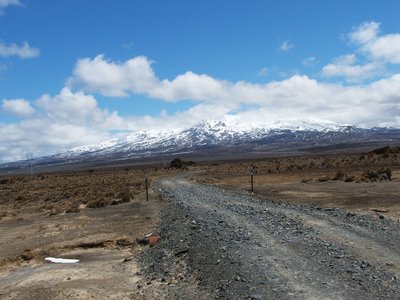
The Houses of Parliament (the building on the left is called "The Beehive" for obvious reasons):
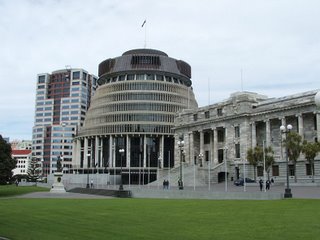
Wellington at dusk from Mt Victoria:
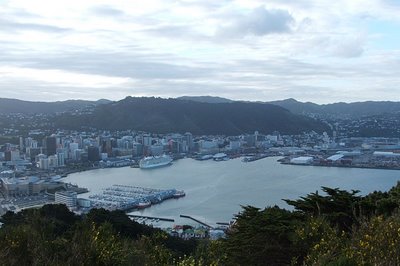
Wai-O-Tapu Thermal Wonderland mineral terraces in the making:

Traffic sign at Wai-O-Tapu. It's becoming increasingly common at tourist spots to put signs or arrows on the road to remind overseas visitors that we drive on the left side of the road.
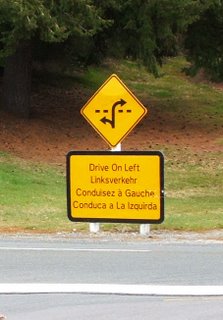
Rotorua Museum:

Friday, October 20, 2006
Back Home
Saturday, October 14, 2006
Off to Wellywood
There are unlikely to be any entries for about a week.
In the meantime, feel free to check out any of the links at right, or maybe one of my other favourite sites, Slap Upside the Head, which looks at Canada and its anti-gay right wing ("Combatting bigotry the gayest way I know how", the creator of the site says). It's witty, interesting, and clever—and you just may learn a thing or two about Canada in the bargain. Only posted on Monday, Wednesday and Friday (Canada time), unfortunately, but well worth a look.
Friday, October 13, 2006
Greed
Some people hold an almost religious view of capitalism and “the market” as essentially good or, at least, neutral. But how can anyone seriously believe that it’s neutral, let alone good, when its very structure encourages the accumulation of greater wealth in fewer hands?
I believe that in recent years the whole paradigm of business has shifted. In the past, businesses worked to produce the best product or service at the best price in order to gain market share and profits. To do so, businesses needed to adhere to certain minimal standards in the treatment of their employees, their suppliers, their customers and the environment. Few businesses did this all the time, and many didn’t do it well. But the point is that to succeed in business, to make a good profit, it was necessary to make at least some effort to be a “good citizen.”
That’s all changed. Now, the only thing that matters is maximising profit and the return to shareholders. Screw everything and everyone that gets in the way of that goal.
The proof is far too long a list to include here, but consider just a few: Tobacco companies continue to sell products that they know to be deadly, and fight every effort at regulation. Some large, profitable corporations in America didn’t made as big a profit as shareholders wanted, so the share price fell, and the company then laid-off workers in an attempt to increase profits. Other companies have engaged in deceit in accounting practices, manufacturing or price-rigging.
All of these companies were only acting in accord with the modern business paradigm: They’re all trying to maximise return to shareholders. If that was the only concern in the world, they’d be heroes.
But to reap these rewards for shareholders, real people are made to suffer. It’s not just about companies continuing to fight paying decent wages to workers, nor their efforts to block unions. The larger effect is social. For example, millions of Americans are unable to afford even basic health care.
Meanwhile, an unholy alliance of politicians, business leaders and sometimes even religious leaders works to keep people from realising the extent to which big business is ripping them off and screwing them over in pursuit of higher profits. By keeping people divided, straight against gay, white against non-white, middle class against poor, these modern day robber barons can safely laugh all the way to the bank.
The trick, in my opinion, is to find a way to stop the greatest excesses of big business, while not discouraging individual enterprise. As a thoroughly Western individual, I quite like the freedom and independence that our culture offers. But that doesn’t give big business permission to do whatever it wants in the pursuit of profit. Healthcare, for example, is a human right, not a privilege to be given only to the rich or middle class.
To be sure, business will moan and cry whenever they’re forced to do what in their hearts they know is the right thing, and the trans-national corporations will attempt to get around national laws by moving operations to countries with loose regulation. This is why a strong international regulatory framework is so important.
I’m not terribly optimistic that this will happen. Bald greed has taken hold in corporate boardrooms to an extent not seen since the 1980s, and politicians don’t seem to have the spine to taken them on.
Here in New Zealand, at least, there’s some good news. The Commerce Commission fined timber products company Carter Holt Harvey for deliberately selling sub-standard housing timber (at the time CHH did this, the company was foreign owned). The Commission also fined Telecom New Zealand for overcharging customers over a 17 year period. In both of these cases, the companies knew of the problems but did nothing to fix them.
The government, too, has moved to force Telecom to unbundle the local telephone loop, opening up the copper wire phone network to competition. The recent moves against Telecom came after successive governments hesitated to act against the company because of its huge dominance of the New Zealand share market.
Sometimes, governments or regulators are our only defence against rampant big companies. It would be nice to be able to depend on them more, but all too often politicians are lacking a spine and regulators lack teeth. It’s good to see that at the moment, at least, the people of New Zealand seem to have some protection from the excess of big business and its greed.
For related content, I recommend The Gay Expat podcast episode 25 (GEP 25: More Important Than Money), in which he summarises other podcasts discussing other aspects of this issue and offers interesting commentary. Links to the other podcasts are provided on his site.
Wednesday, October 11, 2006
Beautiful Places

One of the best things about living in New Zealand is the close proximity of beautiful places. There are a lot of them. And no place in New Zealand is more than about an hour’s drive from the sea. Today was a day to take in some of those places.
We went for a drive north of Auckland. On the way back, we stopped at Wenderholm Regional Park, where the photo at the top of this post was taken. In summer, the park is packed, but it’s still spring and today is the middle of a work week so instead this beauty spot was largely abandoned.
Further south, we stopped just above Orewa for some photos looking back toward Auckland. Orewa is a major destination during the summer holidays, mostly thanks to this huge beach. But the motorway has been pushed north from Auckland, reducing travel time, and now it’s feasible for someone to live in Orewa and commute to Auckland. This will probably change everything for the town. The beach, however will remain.

The main purpose of the trip was to go to Sheep World, a tourist attraction in the Dome Valley north of Warkworth. The place sounded totally naff to me, but it wasn’t nearly as bad as I thought it might be. Part of it was really interesting, and the café was nice, too.
 New Zealand has around 45 million sheep, which has given rise to at least that many jokes, most of which are far more tiresome than funny. Nevertheless, it’s no exaggeration to say the country was built on the backs of these animals. I took this photo of an orphan lamb being tended by Sheep World. Tourists are allowed to bottle-feed these lambs. Okay, take a moment now to say, “Awwwwwww.” The good news is that we were told these lambs will end up being adopted out as pets. I guess that means that they won’t become someone’s Sunday dinner, as I would’ve thought.
New Zealand has around 45 million sheep, which has given rise to at least that many jokes, most of which are far more tiresome than funny. Nevertheless, it’s no exaggeration to say the country was built on the backs of these animals. I took this photo of an orphan lamb being tended by Sheep World. Tourists are allowed to bottle-feed these lambs. Okay, take a moment now to say, “Awwwwwww.” The good news is that we were told these lambs will end up being adopted out as pets. I guess that means that they won’t become someone’s Sunday dinner, as I would’ve thought.We're going on a road trip to Wellington at the end of the week, taking in the compulsory tourist spots of Rotorua and Taupo. I won't be posting photos from all those places, and there are unlikely to be any more sheep photos. But there will be more shots from beautiful places.
Monday, October 09, 2006
Museum Day
The Museum was built essentially to serve as a war memorial to the people who lost their lives in the First World War, and later, every subsequent war. The top floor has spaces dedicated to this purpose, and other spaces for explaining the wars.
The lower floors examine the environment and cultural history of
Back on the top floor, the WW1 Sanctuary records the names of Aucklanders who fell in the war around all four walls. Apparently, almost a third of those killed in the war have no known grave. This hall provided a place to remember those lost.
Around the other side is the WW2 Hall of Memories, in which are inscribed the names of the Auckland dead from WW2, the Korean War, the Malaya-Borneo Conflict and the Vietnam War. The two halls together have a lot of names on the walls.
Today,
The country steers a largely independent foreign policy, which has drawn it into conflict with both
Personally, I think that if a few more countries adopted
Sunday, October 08, 2006
Learning to Walk
In my part of the publishing industry, creating ads and editorial layouts primarily for newspapers, it’s a pretty good idea to be able to use and spell words correctly. Doing this in New Zealand meant using their spellings, of course, which are mostly the same as Britain but with a few exceptions, including the use of many Māori words.
I was generally able to adapt to this pretty quickly, except sometimes I’d revert to “check” instead of “cheque”. I have no idea why that one word would be so hard.
Adapting to the metric system was easy for weights and measures, a little more difficult for temperature. If someone told me it was 21 outside, I had no idea if that meant it was time to bundle up or strip off.
With both language and metrics, it soon dawned on me that the only way to learn them and make them second nature was to just completely switch and not be tempted to make any conversions. This was hardest for me with those temperatures until I remembered that when I was a kid, early each spring my mother would have me draw a thermometer on paper, with various temperatures indicating what weight of coat I was to wear.
I didn’t make an adult version of that thermometer, but the memory of it helped me to realise that there once was a time when I didn’t know how American temperatures felt, either. Eventually, I did learn them, and so I knew that eventually I’d learn what metric temperatures would feel like, too. And I have.
So in some ways, learning to live in another culture has been like learning to walk all over again, though hardly that dramatic. The point is that things I once took for granted—like spelling or knowing what jacket, if any, would match the temperature—had to be learned all over again.
There were other things I needed to do—learning to drive on the left hand side of the road being hardest of those—and I’ll talk about them and my coping strategies in future posts. But if I could say one thing to my newly-arrived self, or any other new expat, it would be this: Relax. The things that seem so foreign at first will eventually become everyday and familiar. Just give yourself time and cut yourself some slack. And remember, you’ve got to learn to walk before you can run.
Saturday, October 07, 2006
Reasonable Response
As blogs and podcasts have evolved, many have done so with an ethos of cooperation and contribution. Certainly the blogs I read and the podcasts I listen to the most are in that category, and there’s not one that doesn’t invite feedback, discussion and contribution from the “audience”. In so doing, it’s redefined the relationship between “content provider” and “audience” so that at any given time either can switch roles.
This allows us all to try on new ideas, or new approaches to old ones, to discuss and refine and discuss some more and to do so no matter how much distance is between us. This has got to be a good thing for the spread of global democracy. But it’s also pretty exciting to be able to share and discuss ideas with people in many walks of life in many parts of the world. In this one aspect, at least, the world is a global village and we’re all hanging out in the village square.
A couple posts ago, I was talking about being an expat and not an “ex-pat”. That discussion was inspired, in part, by a podcast I listen to called The Gay Expat in which he discussed this topic. He, in turn, read my post, then read it aloud on his podcast (GEP24).
This felt a little surreal to me because I can’t remember ever hearing anyone reading aloud something I’ve written. Okay, maybe a teacher when I was a kid, but not since I became an adult.
More importantly, however, this reinforced for me the collaborative nature of the Internet now, through blogging and podcasting and feedback to them. By using our blogs or podcasts to talk about things others say in their blogs or podcasts, we widen the discussion beyond simply comment/reply in one place to a more robust discussion going on in several places at once, all looping back and forth and interconnecting in many interesting ways.
So, to further this looping of discussion, in another part of The Gay Expat’s GEP24 he talks about the nature of discussion on the Internet, looking at whether behaviours are any different in different cultures.
“The Internet reflects what the Internet is to different cultures,” he begins. “In the US, the Internet is a place to vent and debate without the usual conversational barriers, such as political correctness, the feeling that one needs to sanitise their conversations to be nice and not offend people.” Because of this, US Internet discussions can be more extreme and personal than ordinary speech might be.
I’d agree with that, but it’s not limited to the US. I’ve scratched around a few New Zealand blogs, and on several I’ve found the sorts of personal attacks that he says are common on some US sites. Admittedly, I don’t always know the country of origin of the person writing the responses I saw, but since the sites were dealing specifically with NZ politics, I’d guess that most Americans don’t even know they exist, much less take an interest in them.
Personally, I’d prefer the sort of fact-based discussions filled with decorum that The Gay Expat says are common on French Francophone sites. Pity I don’t speak French. But I also have to admit that—up to a point—I don’t mind an intense discussion, either. The limit for me is reached when people are personally belittled like a schoolyard bully would do. Stick to the facts, be truthful, and I don’t really mind how forcefully the ideas are expressed, though before they enter a discussion people really should try and read as deeply as The Gay Expat has found French readers do.
But a little discussion is better than none, and if that discussion isn’t quite as well informed or as dispassionate as I might like, I’ll take what I can get. After all, there are a growing number of us who value reasonable response and can help to rein in those who don’t.
Guided Tour, Day Two

Friday, October 06, 2006
Travels, Part One
The photo with this post is Auckland city, taken from Devonport’s North Head.
Thursday, October 05, 2006
Ex, but not ex-
In America, I was vaguely familiar with the term, though in my mind it conjured up images of Gertrude Stein’s salon in Paris, with all sorts of artists and writers hanging around, being witty and profound and eating and drinking too much.
My real-life adventure in New Zealand was nothing like that, apart from the overeating and drinking, of course (yes, I’m joking). But the main reason, I think, that I didn’t know the label very well was that it’s kind of alien to Americans. There, a common attitude would be, if you’re not Gertrude Stein or Ernest Hemmingway or whoever, why on earth would you leave America?
Shortly before I left the US, a work colleague said to me, “I could never do what you’re doing; I love my country too much.” She was an ordinary, reasonable person, not some knuckle-dragging ideological throwback, so her comment caught me totally by surprise. I thought to myself, in the words of the song, “What’s love got to do with it?” I have friends and family I never see, but that doesn’t mean that I don’t love them. For me, it’s the same with my homeland, and, anyway, I don’t think that love of a place is an either/or situation.
Over the years, I began to suspect Americans’ problem with the word is pronunciation, and maybe a misunderstanding of the spelling.
The “ex” means “out of”, not “former”, as some people apparently think. The second part is derived from the Latin “patria” or native land. Many people pronounce the second part so it rhymes with “patriot” so, in their minds, one is an “ex-patriot”, which really amounts to some kind of traitor. I prefer the pronunciation “exPATtriat” instead of “exPAYtriat” to stress that it’s a different word.
One of the podcasts I listen to is The Gay Expat (“An eclectic multimedia conversation with a 30 year-old gay expat in Paris.”). He discussed this subject recently (especially in GEP23—there’s a link to that podcast on his site), and apparently he’s come across some of the same reactions among Americans that I have. He basically suggests that some Americans may use the hyphen (the incorrect “ex-pat” instead of the correct “expat”) in order to express disapproval of someone being an expat. I’d agree with that.
Americans need to get over the idea that the whole world wants to be American (they don’t, by the way). And Americans also need to realise that someone can live outside the country and still be fully American. I’ve said over and over again that I’ll never, ever renounce my American citizenship. It’s as much a part of me as my eye colour or anything else. But that doesn’t mean that I can’t also love New Zealand and be a citizen of this country.
So, I’m an expatriate American, but I’m definitely not an ex-American, though some people in the US of A might wish I was. Probably like a lot of New Zealanders, I think of myself as a sort of citizen of the world. And that, too, is a common feeling among expats the world over.
Imagine what the planet would be like if more people—and Americans in particular—felt that way. It’s never too late to start.
Wednesday, October 04, 2006
Lucky lingo
I’m really lucky. I moved to a country where they speak the same language as me (more or less). Seriously, while I can remember words and phrases in languages other than English, I don’t seem suited to actually taking on another language.
I studied German in high school, but neither that nor occasional brushing-up in the years since, nor a trip to
Which is not to say that it’s been all plain sailing, linguistically speaking. When I first arrived in
It was no easier for people I encountered. After all, I was the one with the accent, not them, and my slang was different from theirs. From their perspective, I was the one who was difficult to understand.
In those early days, there was a Molenberg bread ad on television that featured soldiers out for a run and doing one of those military-style sing-song chant things they do (in movies and TV, anyway). I had absolutely NO idea what they were saying. To me, it sounded like gibberish.
I realised that my linguistic conversion, if you will, had been largely completed when some years later the TV commercial was aired again and I understood every word.
However, even now there’s still the odd slang word I hear that I don’t know, but these days I’m just as likely to be using the words and phrases that once confused me. Partly because of that, and because my accent has shifted, people seem to have far less trouble understanding me now than back nearly eleven years ago.
All of which has been on my mind with the imminent arrival of my American friend
He begins his long journey in about four hours, arriving here about 27 hours later—a little more than thirty-one hours from now. I’m sure my questions will start being answered fairly soon after his arrival.
Tuesday, October 03, 2006
Another Flag Day
Well, apart from the fact that there are people of German decent living in
However, Transit New Zealand, which overseas the Auckland Harbour Bridge, routinely replaces one of the two New Zealand flags flying on the bridge to honour the national day of other countries.
Today it was
I didn’t take a picture of the bridge flags today, because, hey—I didn’t know today was German Unity Day, either (so apparently I need to learn more about other countries, too). But to illustrate what bridge flag business is like, here’s a photo I prepared earlier—a rainy, gloomy
Monday, October 02, 2006
Rain, Rain, Rain
It's been bucketing down the past couple days, with heavy downpours, flash flooding, landslips and even a mini-tornado. It's been Spring showers on steroids.
October is the equivalent, more or less, of the Northern Hemisphere's April, so some showers to bring spring flowers are in order. But this is ridiculous. Fortunately, the weather in October is generally pretty settled, so it may yet clear up in time for my American friend
The NZ dollar has been falling against the US dollar recently, and that's certainly good news for
So we have falling rain and a falling dollar, but rising spirits because Spring's arrived, and my friend's about to. A little sunshine would be nice, though.
Sunday, October 01, 2006
Spring Ahead
Even so, every time the clocks change, now and in autumn, people complain about how hard it is for them to adjust. I don’t usually share that problem, so I admit I don’t really understand why others do.
But I understand even less why people can’t remember which way to turn their clocks. Americans, in particular, have no excuse with their “spring ahead, fall back” phrase. In New Zealand, where the season between summer and winter is called autumn, it’s understandable why people don’t remember.
But maybe the larger question has nothing to do with why some people have so much trouble adjusting to the time change, or why others can’t remember which way to turn their clocks. Maybe the real question is why we change them at all any more.
If we didn’t change the clocks, though, what would we all use to remind us to check smoke detector batteries?

